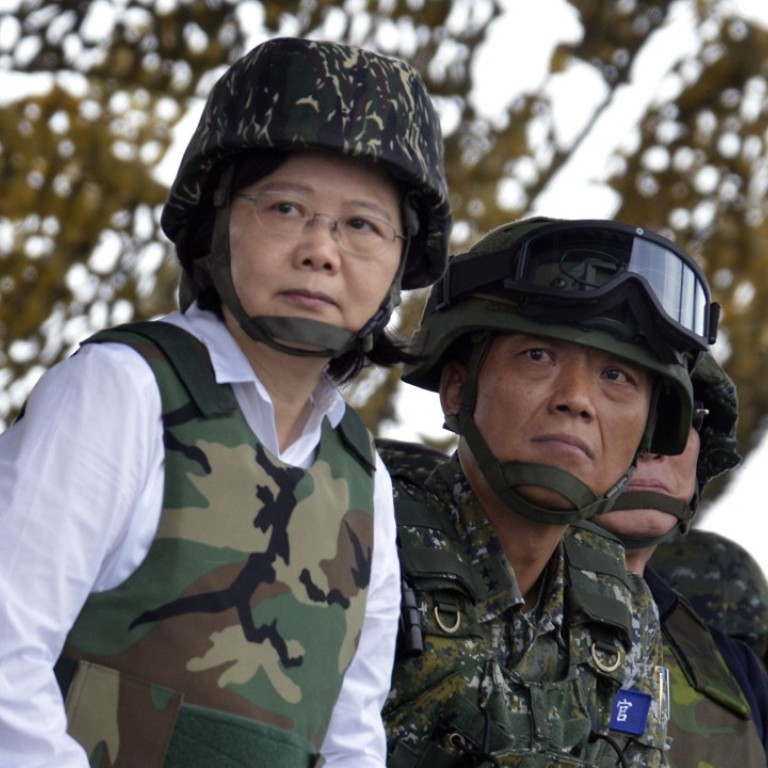
US arms sales a morale booster for Taiwan, says Tsai Ing-wen
Taiwanese president welcomes US plan to provide a new weapons package for the island’s defence, but analysts see promise as a political gesture that will provoke Beijing further
Taiwanese leader Tsai Ing-wen has welcomed the promise of a US arms sales package – which comes amid escalating cross-strait tensions – as a boost to security and military morale.
But analysts say it will only worsen relations with the mainland, and that the US appears to be once again using Taiwan as its pawn in dealing with Beijing, given the timing of the sale.
The administration of US President Donald Trump on Thursday notified Congress of its plan to go ahead with the controversial US$1.4 billion arms package, the first such sale since Trump’s predecessor, Barack Obama, sold US$1.8 billion worth of arms to Taiwan in 2015. The package still needs approval from congress within 30 days.
“The provision of these systems will help strengthen Taiwan’s self-defence capabilities,” Tsai said on Friday. “This increases Taiwan’s confidence and ability to maintain the status quo of peace and stability across the Taiwan Strait.” Tsai added that Taipei would continue to invest more in defence.
The island’s defence and foreign ministries said the package indicated a consolidated US commitment to defend the island, in line with the Taiwan Relations Act that was instituted after Washington switched diplomatic recognition to Beijing from Taipei in 1979.
“This package can help to maintain peace across the Taiwan Strait since the weapons will boost our air and sea power and early warning systems, strengthening our ability to defend ourselves,” the defence ministry said in a statement.
But analysts said the promised sale was more of a political gesture and would not have much real impact on Taiwan’s defences.
Wang Kung-yi, a professor of international relations and strategic studies at Tamkang University, said Taipei was aware the sales were meant to pressure Beijing to do more to rein in Pyongyang’s nuclear weapons programme.
Many weapons on Taiwan’s wish list were not included in the package, Wang said, adding that it indicated that Trump wanted to use the sales as leverage in dealing with Chinese President Xi Jinping.
Taiwan had asked for fifth-generation F-35 fighters and more Stinger missiles, among other advanced weapons. But those in the package were “defensive”.
“They are necessary in terms of helping upgrade some of the obsolete systems here, but cannot compare with the weapons the US has sold to Japan and South Korea, and are far from being advanced enough to counter any possible PLA attack,” said analyst Oscar Hsieh.
He noted that the package proposal came after Xi went to Hong Kong to mark the 20th anniversary of the handover, and with the Chinese aircraft carrier, the Liaoning, expected to visit the city next week.
It also comes a day after the US Senate Armed Services Committee approved a bill that would allow regular stops by US naval vessels to Taiwan’s ports and permits US Pacific Command to receive ports of call by Taiwan.
“It’s hard to imagine that the Trump administration would really approve the port call proposal – which still needs approval from congress – given its highly sensitive nature. But the planned arms sales do add weight to Trump’s wrestling match with Beijing,” Hsieh said.
The port call proposal was unlikely to be approved, observers said, as it would antagonise Beijing to an unprecedented level.
Philip Yang, president of the Taiwan Association of International Relations, expected Beijing to respond by taking further action to isolate Taipei.
“Still, it’s the best time for the Trump administration to announce the sales, ahead of the 19th National Congress of the Communist Party expected to be held in autumn,” Yang said, adding that it was difficult to say whether Beijing would take a tougher line on Taiwan after the autumn leadership reshuffle.
Beijing suspended talks and exchanges with Taipei after Tsai took office last year and refused to accept the “one-China” principle.
The weapons package comprises seven items, including technical support for early warning radar, anti-radiation missiles, torpedoes and components for SM-2 missiles, the Associated Press reported.

